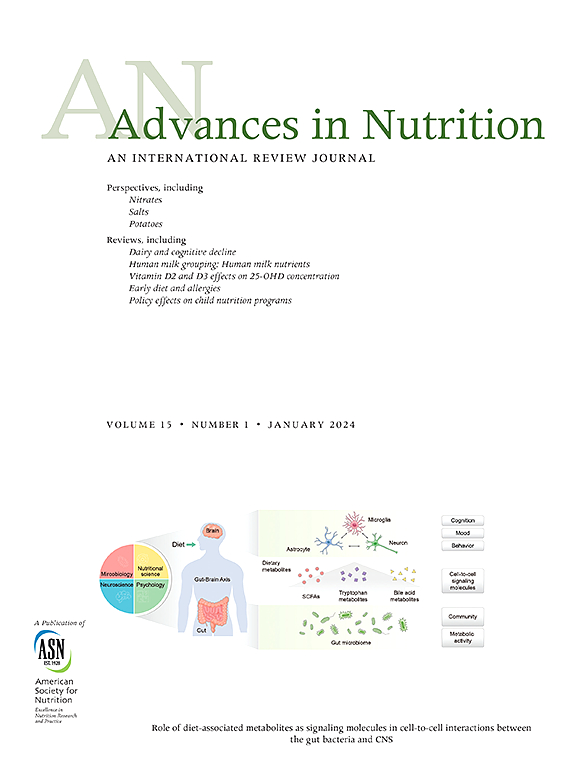受教育程度是饮食质量和饮食不平等的超级决定因素。
IF 9.2
1区 医学
Q1 NUTRITION & DIETETICS
引用次数: 0
摘要
饮食质量的不平等在世界范围内是显而易见的,反映了结构性劣势。越来越多的证据表明,饮食不平等可能与受教育程度有关,这一发现与普遍认为饮食不平等主要归因于物质劣势(即收入不足)的观点相矛盾。此外,随着受教育程度的下降,饮食质量也会下降,因此这些教育不平等影响到整个社会。这一观点的目的是假设教育程度是饮食质量和饮食不平等的关键结构分层因素——我们称之为超级决定因素——并且应该给予更多的研究关注,以询问教育程度影响饮食质量的途径。为了阐明我们的观点,我们在PubMed和b谷歌Scholar中进行了广泛的关键词搜索,以确定与饮食质量、健康和死亡率方面的教育不平等有关的概念、理论和经验数据,然后对研究结果进行概念性综合。基于这些发现,我们首先描述了受教育程度影响饮食质量的途径。然后我们证明,饮食质量方面的教育不平等往往比收入方面的教育不平等要大得多。例如,在加拿大,受教育程度最高和受教育程度最低的成年人在2015年健康饮食指数得分上的绝对差距和梯度为7-11分,而与家庭收入相比,他们的差距仅为2-5分。我们提供了与国际上在饮食质量、健康和死亡率方面日益严重的教育不平等有关的证据。我们随后考虑了一个重要的反事实——健康饮食的可负担性是饮食不平等的关键决定因素——并通过经验证明,经济因素并不是饮食质量中社会经济不平等的主要驱动因素。我们的结论是,将饮食不平等主要归因于健康食品的高成本过于简单化,忽视了教育程度作为饮食不平等的结构性分层因素的关键作用。本文章由计算机程序翻译,如有差异,请以英文原文为准。
Educational Attainment as a Super Determinant of Diet Quality and Dietary Inequities☆
Inequities in diet quality are evident worldwide and reflect structural disadvantages. There is increasing evidence that dietary inequities may be most meaningful in relation to educational attainment, a finding that contradicts the common belief that dietary inequities are primarily attributable to material disadvantage (i.e. inadequate incomes). Moreover, diet quality declines with each step down the educational ladder, and therefore, these educational inequities affect all of society. The purpose of this perspective is to posit that educational attainment is a key structural stratifier of diet quality and dietary inequities—what we term a super determinant—and that greater research attention should be given to interrogating pathways through which educational attainment shapes diet quality. To inform our perspective, we conducted extensive keyword searches in PubMed and Google Scholar to identify concepts, theories, and empirical data pertaining to educational inequities in diet quality, health, and mortality, followed by a conceptual synthesis of findings. On the basis of these findings, we first describe pathways through which educational attainment shapes diet quality. We then demonstrate that educational inequities in diet quality are often much larger than they are for income. For instance, absolute gaps and gradients in Healthy Eating Index-2015 scores between the most and least educated adults were 7–11 points in Canada, whereas they were just 2–5 points in relation to household income. We provide converging evidence related to large and growing educational inequities in diet quality, health, and mortality internationally. We subsequently consider an important counterfactual—that the affordability of a healthy diet is the key determinant of dietary inequities—and empirically demonstrate that economic factors are not primary drivers of socioeconomic inequities in diet quality. We conclude that attributing dietary inequities primarily to the higher costs of healthy foods is overly simplistic and ignores the critical role of educational attainment as a structural stratifier of dietary inequities.
求助全文
通过发布文献求助,成功后即可免费获取论文全文。
去求助
来源期刊

Advances in Nutrition
医学-营养学
CiteScore
17.40
自引率
2.20%
发文量
117
审稿时长
56 days
期刊介绍:
Advances in Nutrition (AN/Adv Nutr) publishes focused reviews on pivotal findings and recent research across all domains relevant to nutritional scientists and biomedical researchers. This encompasses nutrition-related research spanning biochemical, molecular, and genetic studies using experimental animal models, domestic animals, and human subjects. The journal also emphasizes clinical nutrition, epidemiology and public health, and nutrition education. Review articles concentrate on recent progress rather than broad historical developments.
In addition to review articles, AN includes Perspectives, Letters to the Editor, and supplements. Supplement proposals require pre-approval by the editor before submission. The journal features reports and position papers from the American Society for Nutrition, summaries of major government and foundation reports, and Nutrient Information briefs providing crucial details about dietary requirements, food sources, deficiencies, and other essential nutrient information. All submissions with scientific content undergo peer review by the Editors or their designees prior to acceptance for publication.
 求助内容:
求助内容: 应助结果提醒方式:
应助结果提醒方式:


